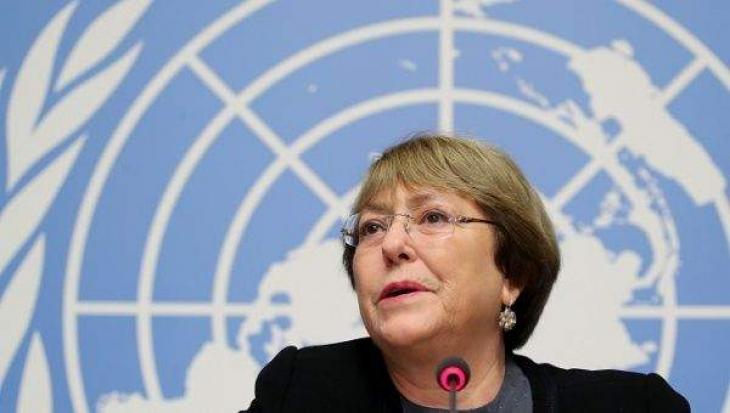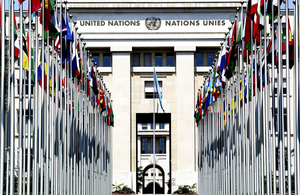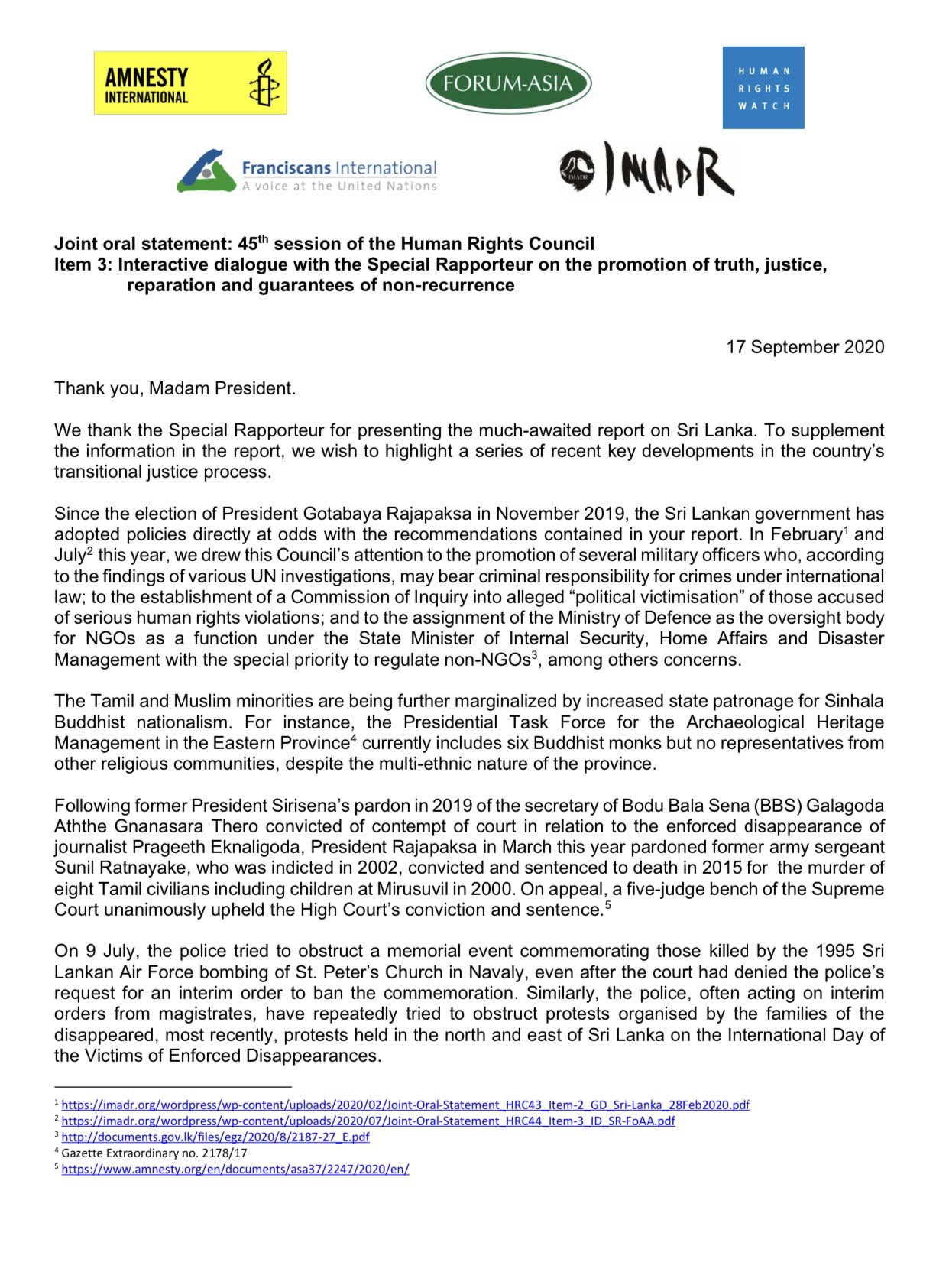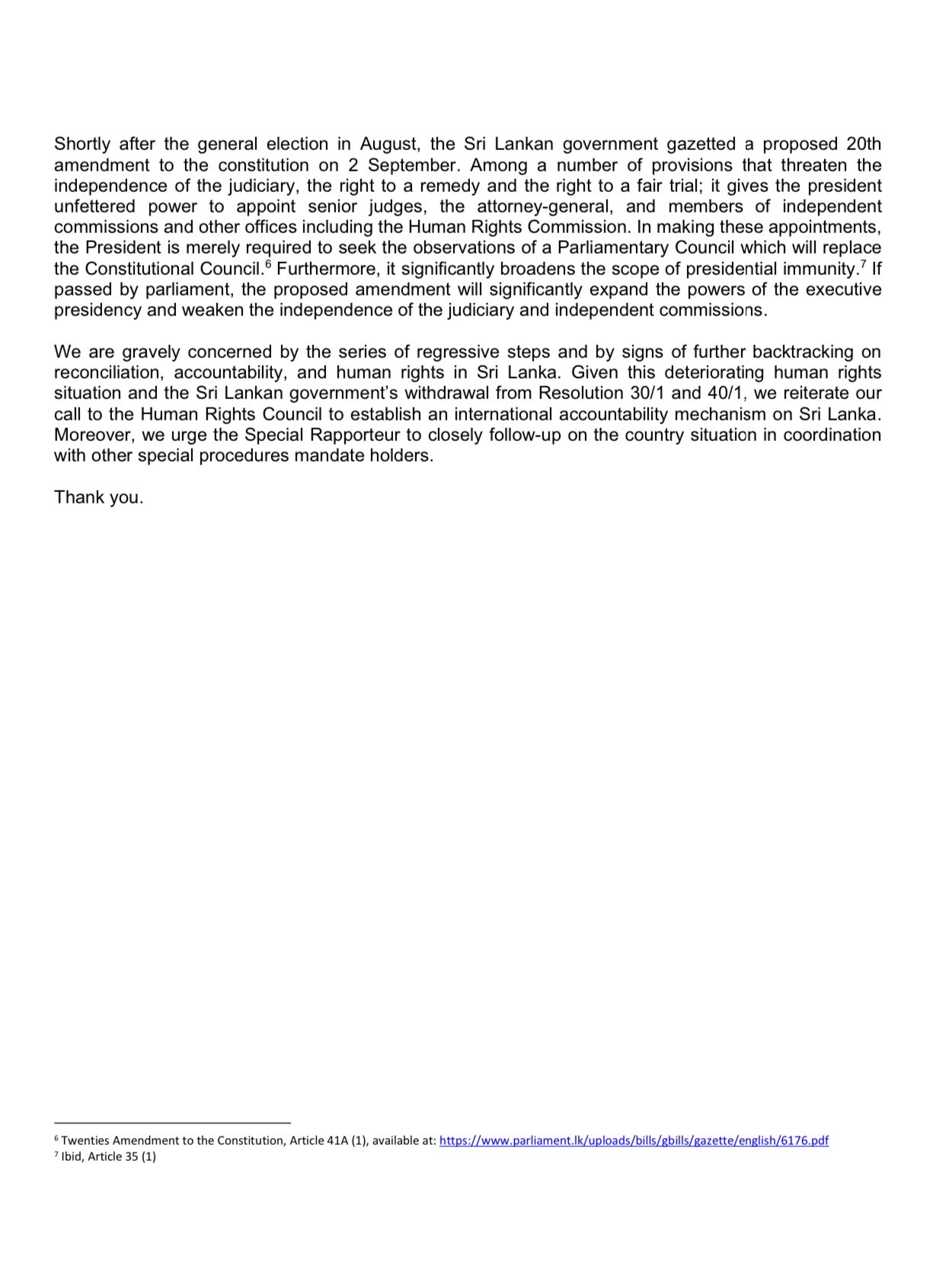High Commissioner for Human Rights opening statement, September 14, 2020
 In Sri Lanka, I am troubled that the new Government is swiftly reneging on its commitments to the Human Rights Council since it withdrew its support for resolution 30/1.
In Sri Lanka, I am troubled that the new Government is swiftly reneging on its commitments to the Human Rights Council since it withdrew its support for resolution 30/1.
Among other developments, the proposed 20th amendment to the Constitution may negatively impact on the independence of key institutions, including the National Human Rights Commission.
The pardon given in March to a former Army sergeant convicted of participating in unlawful killings; appointments to key civilian roles of senior military officials allegedly involved in war crimes and crimes against humanity; and moves within the police and judiciary to thwart the investigation of such crimes, set a very negative trend.
The surveillance and intimidation of victims, their families, human rights defenders, journalists and lawyers should cease immediately.
I encourage the Council to give renewed attention to Sri Lanka, in view of the need to prevent threats to peace, reconciliation and sustainable development.
Sri Lanka Core Group Statement – HRC 45, September 14, 2020
Thank you Madam President.
This statement is on behalf of Canada, Germany, North Macedonia, Montenegro and the UK, the Core Group on Sri Lanka.
We note the High Commissioner’s concerns on Sri Lanka in her update.
The Core Group pays tribute to the people of Sri Lanka and to all those involved in delivering safe and peaceful Parliamentary elections, despite the challenges of Covid-19.
Next March, the Council will consider an important report by the High Commissioner, on human rights, reconciliation and accountability in Sri Lanka. Specifically, it will consider the steps taken to implement resolution 30/1, through which, in 2015, the Council created a consensual framework to help Sri Lanka heal the wounds of its past and to address unresolved serious violations and abuses documented by the High Commissioner. This framework was renewed twice by this Council by consensus and with the explicit support of Sri Lanka.
The Government of Sri Lanka has been clear to this Council that it no longer supports resolution 30/1. The Core Group, once again, reiterates its profound disappointment at this development.
The Sri Lankan Government has also stated its continuing commitment to fostering reconciliation, justice and peaceful coexistence among Sri Lanka’s diverse communities. It has suggested that a new domestic process will take this agenda forward. While we appreciate this continued commitment, previous such processes have, regrettably, proved insufficient to tackle impunity and deliver real reconciliation. This Council will want to pay particular attention to how the new approach, will differ from these previous attempts and put the victims of conflict at its heart. The future of the Independent Commissions including the Office for Missing Persons and Office for Reparations will be particularly important.
In the meantime we continue to hear concerns about an increasingly difficult operating environment for civil society and human rights groups in Sri Lanka. Instances of intimidation, harassment and surveillance continue, including threats to families of disappeared persons. Individuals are detained indefinitely without appearance before court, such as lawyer Hejaaz Hizbullah.
Sri Lanka’s dynamic and diverse civil society lies at the heart of its vibrant democracy. The Core Group expresses its strong solidarity with Sri Lanka’s civil society, and human rights defenders, and calls on the government to take all steps necessary to allow them to operate freely.
Thank you
The full statement made by Sri Lanka during the General Debate, September 14, 2020
Madam President,
Sri Lanka wishes to respond to the references made by the High Commissioner for Human Rights to Sri Lanka in the ‘Global Human Rights Update’ on 14 September 2020.
As this Council is aware, since February/March this year, the entire world was challenged by the COVID-19 pandemic, a health crisis of a global scale, which had impacted many aspects of governance in many countries, and Sri Lanka was no exception.
We hope that this Council would appreciate that Sri Lanka while successfully containing the spread of COVID-19 through a balanced, multi-sectoral approach, and despite this challenge, held its commitment to the democratic processes, and conducted Parliamentary elections successfully and peacefully, last month, which the EU has acknowledged.
Madam President,
Sri Lanka made it clear even as it withdrew from the co-sponsorship of Resolution 30/1, that it will remain committed to achieve reconciliation, accountability and human rights within the framework of the Sri Lankan Constitution, through a domestically designed and executed process in line with the Government’s policy framework. Sri Lanka would like to state further that the new Government which assumed office with the election of the new Parliament on 5 August remains committed to the assurances given before this Council in February this year.
The draft 20th Amendment to the Constitution submitted through the Parliament will be discussed, debated, following a complete democratic process, where all stakeholders will have the opportunity to present their views. Therefore, the GoSL is of the view that High Commissioner’s comments on the proposed 20th Amendment are unwarranted and pre-judgmental, based on presumption.
The GoSL wishes to state that the pardon to the former Army sergeant was granted in terms of the powers and provisions of the Constitution of Sri Lanka.
Madam President,
The Government rejects the references made to false and unsubstantiated allegations leveled against senior military officials being appointed to key positions of institutions. Sri Lanka has consistently refuted the credibility of these allegations and wishes to highlight that the domestic processes such as the LLRC and Paranagama Commissions that examined these allegations particularly with regard to the last stages of the conflict, have not found substantive evidence against any of the senior military officials referred to in this regard.
In the absence of any substantive proof, Sri Lanka considers that the continued arbitrary accusations on crimes or crimes against humanity made against these senior military officials are unacceptable and a violation of the principles of natural justice.
In conclusion, with regard to allegations of surveillance and intimidation, the Government has already publicly refuted these allegations, and is committed to protecting and promoting freedom of expression and civil society space, and ensure that complaints received on alleged attacks against journalists, human rights defenders and civil society are investigated and prosecuted.
The prime focus of this Government is to ensure national security, and to uphold the rule of law and order in the country for all its citizens, with the aim of creating “an environment where any citizen can live freely without any fear for the safety of themselves and their families.”
In line with the above policy framework, the Government is committed to achieve the Sustainable Development Goals of the UN, with a determination to uplift the lives of all its citizens and ensure that there is no threat to peace, reconciliation or development in Sri Lanka.
Thank you.
Report of the Special Rapporteur on Transitional Justice on his visit to Sri Lanka
SR TJ report on visit to SL A_HRC_45_45_Add.1_
https://undocs.org/A/HRC/45/45/Add.1
Session with Special Rapporteur on Transitional Justice, Septeber 16, 2020
UK government’s statement during interactive dialogue on truth, justice, reparation and guarantees of non-recurrence, September 16, 2020
 Thank you Madam President
Thank you Madam President
The UK thanks Mr Salvioli for his report, and would like to make some remarks in relation to the report by his predecessor on his visit to Sri Lanka.
We welcome the report by Mr de Greiff and its recommendations. We also welcome your expressed interest in following up on it.
We share the concerns expressed regarding transitional justice in Sri Lanka. While we welcome the establishment of domestic mechanisms such as the Office of Missing Persons, the UK has made clear our profound disappointment at the Government’s decision to withdraw support for resolution 30/1. We believe the resolution is a powerful framework for achieving truth and justice.
Effective transitional justice is critical for sustainable reconciliation and peace. We note that previous domestic mechanisms have failed to deliver meaningful justice and accountability.
We share the concerns at the lack of meaningful progress on emblematic cases which embody the struggle of so many victims of conflict. We note with concern the increasing pressure on those members of civil society working for progress on transitional justice, given continued instances of surveillance, harassment and intimidation by security forces. These reports call into question the Government’s stated commitment to transitional justice.
The UK urges the Government of Sri Lanka to give detailed consideration to the recommendations in Mr Greiff’s report. We will continue to support those striving for progress on these issues in Sri Lanka. https://www.gov.uk/government/news/un-human-rights-council-45-interactive-dialogue-with-the-special-rapporteur-on-truth-justice-reparation-and-guarantees-of-non-recurrence
International Movement Against All Forms of Discrimination & Racism (IMADR): Truth, justice, reparation and guarantees of non-recurrence in Sri Lanka, September 16, 2020
Introduction
In 2009, the 26-year civil war in Sri Lanka between the Government of Sri Lanka (GoSL) and the Liberation Tigers of Tamil Eelam (LTTE) ended. The war was characterised with arbitrary arrests, the killing of civilians, enforced disappearances, torture and abductions.[1] Women, especially Tamil women, suffered sexual and gender-based violence by the security forces including rape, sexual slavery and home invasions as highlighted by the Committee on the Elimination of Discrimination against Women (CEDAW).[2]
Following the war, the Government led by then-President Mahinda Rajapaksa failed to investigate violations of international human rights and humanitarian law, hold accountable of those responsible, and provide redress to the victims. While a number of domestic mechanisms were set up such as the Lessons Learnt and Reconciliation Commission (LLRC) and the Commission of Inquiry on Disappearances, they had very limited outcomes.[3]
Progress after 2015
The 2015 Presidential election witnessed the victory of Mathiripala Sirisena. The Government led by then-President Sirisena pledged through co-sponsoring Human Rights Council Resolution 30/1 in 2015 to establish a commission for truth, justice, reconciliation and non-recurrence, an office on missing persons, an office for reparations and a judicial mechanism to investigate allegations of violations of human rights and international humanitarian law. The GoSL co-sponsored the successive Resolutions 34/1 of 2017 and 40/1 of 2019. Yet, among the promised transitional justice mechanisms, only the Office on Missing Persons (OMP) and the Office for Reparation are in place as of August 2020. The domestic justice system failed to bring justice for emblematic cases including the disappearance of journalist Prageeth Eknaligoda, but the GoSL has refused to involve international personnel in investigations into war-related crimes.[4] While the Cabinet approved a proposal to establish an Independent National Commission on Women in 2017,[5] sexual and gender-based violence committed during and after the war remain unaddressed.
In February 2020, the UN High Commissioner for Human Rights warned that the inability to address impunity and reform the institutions responsible for transitional justice fuels the recurrence of human rights violations and the risk of repeating cycles of violence. She also alerted to signs indicating a reversal of the past commitments.[6] Today her concerns are becoming increasingly imminent.
Negative developments since 2019
On 21st April 2019, three churches and three luxurious hotels were attacked by suicide bombers. These attacks caused the death of over 250 people and placed national security back at the centre of the political agenda.[7] On 16th November, Gotabaya Rajapaksa, a candidate from the Sinhalese Buddhist nationalist party Sri Lanka Podujana Peramuna (SLPP) who was the Secretary of Defence, was elected as President. Since then, the GoSL has repeatedly made statements and decisions against transitional justice. On 26th February 2020, the GoSL announced to withdraw from Resolution 40/1 which President Rajapaksa attacked as a “historic betrayal” of the previous government.[8] When outlining his plans to address the issue of missing persons to the UN Resident Coordinator, President Rajapaksa stated that these missing persons were actually dead[9], without any credible investigations. Not only his statement added to the distress of families of the disappeared, but also it violated Sri Lanka’s obligation under the Convention for the Protection of All Persons from Enforced Disappearance (CPED), which it ratified in 2016, to thoroughly and impartially investigate the allegations of enforced disappearances. During the past six months, the interim-government led by President Rajapaksa has seen to the dismantling of the Secretariat for the Coordination of Reconciliation Mechanisms and the Peace Secretariat.
Civil society has expressed concerns on the number of the GoSL’s decisions that undermine democratic governance and the rule of law. Within the first six months of his presidency, President Rajapaksa appointed twenty-four high-ranking military officers to civilian and police positions. The GoSL also announced that the OMP and the Office for Reparations would be continued “with appropriate adaptation in line with Government policy framework”[10], effectively threatening their independence. In March 2020, President Rajapaksa pardoned Sergeant Sunil Rathnayake who had been convicted in 2015 for the murder of eight Tamil civilians including three children in Jaffna in 2000.[11] In June, the Presidential Task Force to “build a Secure Country, Displined, Virtuous and Lawful Society”[12] was established. Headed by Retired Major General Kamal Gunaratne, it has a broad mandate and extensive powers to give directives to “social groups”, all public servants and public institutions such as the Human Rights Commission, the Right to Information Commission and state media.[13] Along with the new Army Commander Shavendra Silva, Retired Major General is mentioned in the 2015 report of the OHCHR Investigation on Sri Lanka for violations of international law. On 31st July, Shani Abeysekara, the former director of the Criminal Investigations Department, was arrested for the allegation of concealing evidence. He had led several high-profile criminal investigations against members of the current government.[14]
In parallel to such militarization, Sinhala Buddhist supremacy is exploited by President which portrays minorities as a threat to the Sri Lankan society. The GoSL refused to include the Tamil language in the national anthem at the celebrations of Independence Day in 2020, although it had been considered as a symbolic gesture towards reconciliation.[15] On 31st March, the Ministry of Health revised the guidelines to require bodies of the victims of COVID-19 to be cremated. This de facto prevents the Muslim community from respecting their religious traditions. Not only it is discriminatory to the minority community, but also it is inconsistent with the World Health Organisation’s guideline which allows both cremation and burial.[16] The Task Force for Archaeological Heritage Management in the Eastern Province is entirely composed of members from the Sinhala community with only Buddhism represented in its membership, despite the fact that the Province is equally populated by Tamils, Muslims and Sinhalese. The Tamil and Muslim communities fear that their rights, in particular the freedom of religion or belief and cultural rights, will be undermined. Such intensifications of Sinhala Buddhist nationalism hamper reconciliation.
Those developments clearly indicate the GoSL’s failure to adhere to its obligations under international law to achieve transitional justice. In May, President even stated that, “If any international body or organization continuously targets our country and our war heroes, using baseless allegations, I will also not hesitate to withdraw Sri Lanka from such bodies or organizations.”[17] The limited progress made since 2015 is at a high risk of backtracking.
Worrying signs from the 2020 Parliamentary elections
As a result of the Parliamentary elections on 5th August 2020, the presidential party won with 59.1% of the votes, with only five seats to the two-thirds majority.[18] It is concerned that the new Parliament will not commit to advance justice, accountability and minority rights due to its dominance by Sinhala Buddhist nationalists.[19]
Together with its traditional political allies, the presidential party can have the two-third majority of the Parliament. This allows President Rajapaksa to revoke the 19th amendment to the Constitution which reduced the power of the Executive Presidency.[20] Such a revocation would significantly weaken checks and balances on the executive and critically jeopardise the independence of the judiciary and relevant commissions. The first cabinet meeting of the new government has approved the revamping of the 19th amendment and to introduce a 20th amendment in early September. The challenge would be to see if Sri Lanka does not collapse into nationalist authoritarianism with a highly centralised executive with an overreliance on the military for its success. This was well demonstrated during the COVI-19 pandemic as President virutally governed the country without a Parliament.
Against this back drop, we recommend:
- The Special Rapporteur on the promotion of truth, justice, reparation and guarantees of non-recurrence to follow-up on the human rights situation in Sri Lanka in coordination with other special procedures mandates holders of the Human Rights Council, especially those who undertook official visits since 2015, and coordinate joint actions in order to hold Sri Lanka accountable to his recommendations; and
- The Human Rights Council to establish an international accountability mechanism on Sri Lanka.
[1] A/HRC/30/CRP.2, paragraph 4.
[2] C/LKA/CO/8, paragraph 24(b).
[3] A/HRC/25/23, paragraphs 31 and 67.
[4] A/HRC/40/23, paragraph 27.
[5] C/LKA/CO/8, paragraph 18.
[6] A/HRC/43/19, paragraphs 7 and 36.
[7] A/HRC/43/19, paragraph 12.
[8] ColomboPage, Sri Lanka government confirms withdrawal from UNHRC consensus resolutions, 19 February 2020. http://www.colombopage.com/archive_20A/Feb19_1582125970CH.php
[9] Presidential Secretariat, UN Resident Coordinator delighted with President’s sustainable development programs, January 2020. https://www.presidentsoffice.gov.lk/index.php/2020/01/17/un-resident-coordinator-delighted-with-presidents-sustainable-development-programs/?lang=en
[10] Statement of Sri Lanka to the 43rd session of the Human Rights Council, 27 February 2020. https://www.un.int/srilanka/news/agenda-item-2-general-debate-presentation-written-update-implementation-hrc-resolution-301-high
[11] Groundviews, Justice in the Time of a Pandemic, 29 March 2020. https://groundviews.org/2020/03/29/justice-in-the-time-of-a-pandemic/
[12] Sri Lanka Briefing Notes, A deadly combination – militarisation, Sinhala Buddhist supremacy and absence of rule of law, July 2020. https://srilankabrief.org/2020/07/sri-lanka-briefing-note-no-17-a-deadly-combination-militarisation-sinhala-buddhist-supremacy-and-absence-of-rule-of-law/
[13] Ibid
[14] Human Rights Watch, Sri Lanka: Increasing Suppression of Dissent, 8 August 2020. https://www.hrw.org/news/2020/08/08/sri-lanka-increasing-suppression-dissent
[15] A/HRC/43/19, paragraph 26.
[16] AL LKA 2/2020, paragraph 4.
[17] Full text of the speech made by President Gotabaya Rajapaksa at the National Ranaviru Day commemorations, 19 May 2020. https://www.un.int/srilanka/news/full-text-speech-made-his-excellency-president-gotabaya-rajapaksa-national-ranaviru-day
[18] Manthri.lk, Vote-to-Seat Tracker, August 2020. http://election2020.manthree.lk/
[19] Journalists for Democracy in Sri Lanka, Sri Lanka: Victims the losers in Sinhala Buddhist landslide, 10 August 2020. http://www.jdslanka.org/index.php/analysis-reviews/politics-a-economy/961-sri-lanka-victims-the-losers-in-sinhala-buddhist-landslide
[20] A/HRC/43/19, paragraph 25.


IMADR Written Statement
https://imadr.org/wordpress/wp-content/uploads/2020/09/A-HRC-45-NGO-145_Written-Statement_Item-3.pdf
Truth, justice, reparation and guarantees of non-recurrence in Sri Lanka (HRC45, 2020, WS)